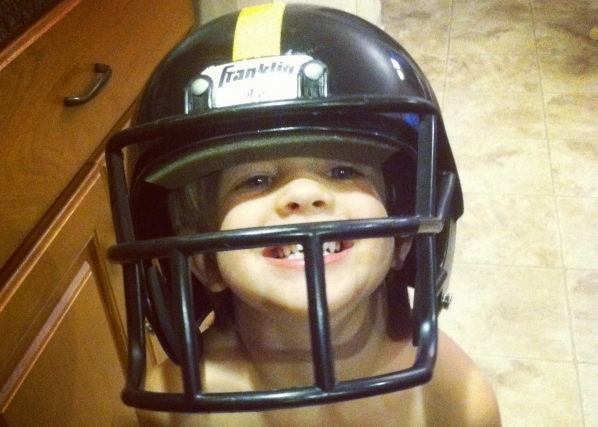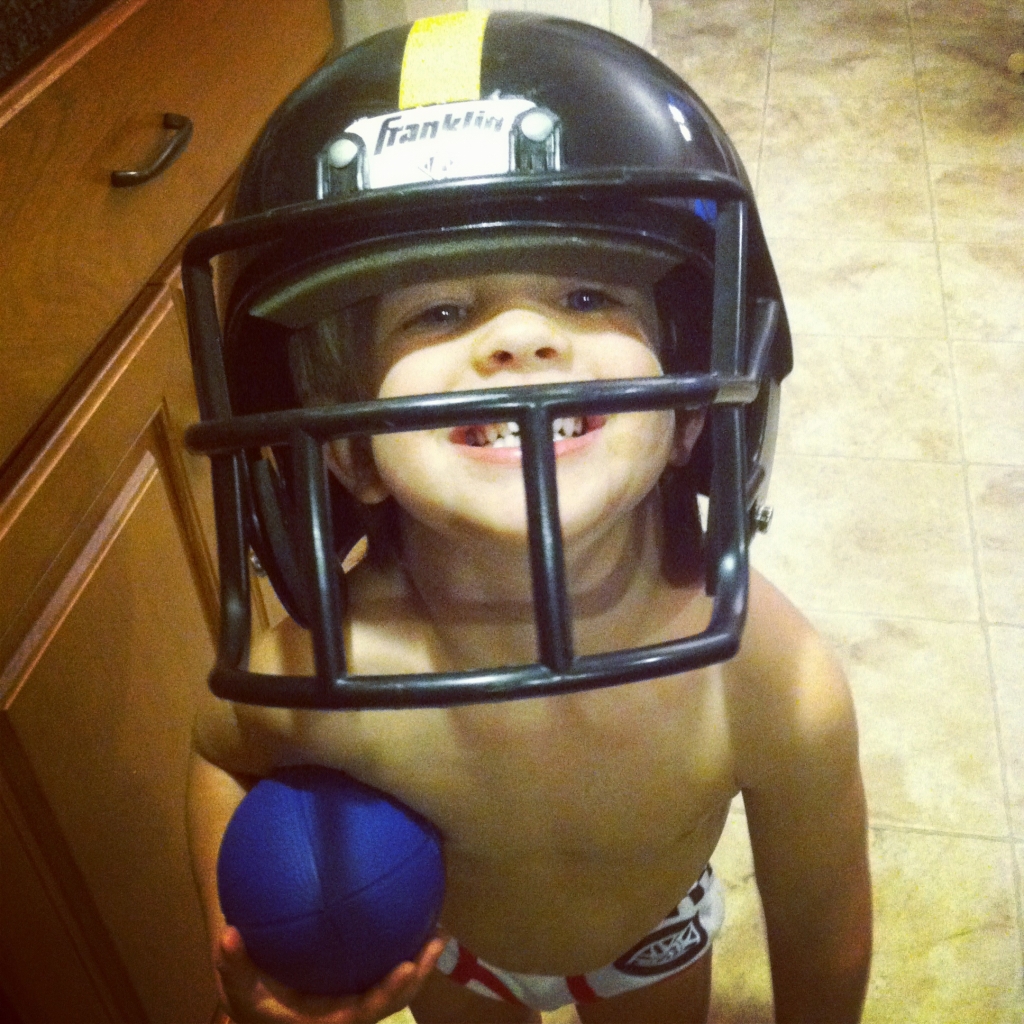It was one of the saddest moments of my childhood, and it happened on a warm summer evening. I was laying on the sofa with my dad and we were watching baseball. He was tired from a long day at work and was drifting in and out of sleep. The air was muggy and warm. I don’t know where everyone else was in the house.
“When you were little, what did you want to be when you grew up?” I asked him, staring at his face, his closed eyes, his straight mouth. I probably thought he looked old. He was probably younger than I am now.
“Dad?” I asked again.
“Yeah?” he said in a sleepy voice.
“I said, ‘What did you want to be when you grew up’?”
“I always wanted to play baseball in the Major Leagues,” he said in a quiet voice. “I wanted to play center field.”
“Really?” I asked. The thought of my father wanting to do something other than what he was doing upended me, as if I was on a boat and someone had pulled down on one side. The world tilted on its axis.
He nodded, somewhere between being awake and sleeping.
“Yeah. Always baseball.”
* * * * *
I’ve been thinking about my own conflicted past when it comes to sports, especially now that I have children old enough to want to play in some of our local community leagues. On the one hand, I love sports. I feel like sports taught me a lot about myself, a lot about perseverance and teamwork and pushing beyond surface levels of comfort. When I had to run a five-minute mile or when I got benched or when I scored a goal – all of these things changed me, gave me insight.
On the other hand, I hate sports, especially what they have become these days. What happened to just showing up and playing and having fun? These days it seems like you can’t be a 12-year-old and just play a sport unless you’re striving to be on a travel team so that you can position yourself well for a club team so that you can get a scholarship to college so that you can play professionally and hey hold on a second what happened to just playing and having fun?
I’m realizing with my oldest son right now, I have two major pitfalls when it comes to him playing sports.
First of all, I want to guard him from any disappointment. I know what it felt like to be the star of the team, and I know what it felt like to get cut, and I hated the latter. I find myself heading him off at the pass, discouraging him in subtle ways from trying certain sports or activities because I don’t want him to experience the disappointment of rejection. That’s not okay. If there’s something he wants to do, I want him to try – the possibility of failure will always be there, and I want him to come to grips with that now, when he’s young. Fail and learn about yourself and try again and fail and learn more and try again. That’s life.
Second of all, I take his performance way too personally. I went through some challenging times playing sports, especially in college, where I got upset about not playing as much as I thought I should. Now, when he gets pulled to the sideline, I feel my blood pressure rising. It’s like I’m back there again, getting pulled off the field, or on the sideline waiting to play. I have to separate my playing experience from his playing experience.
This article put things into perspective: The Only Six Words Parents Need to Say to their Kids About Sports (Or Any Other Performance).
Here’s the spoiler. The six words we need to say to our kids?
“I love to watch you play.”
* * * * *
On that summer night when I had the saddest realization, Dad fell asleep for good, and I was left staring at the television, watching Major League players live out their dream. I was heartbroken, because that’s exactly what I wanted to be when I grew up, and to think that my dad had wanted it as badly as I wanted it and hadn’t made it…I felt so sad for him in that moment. I didn’t move. I stayed there and watched the rest of the game, his arm draped over me, his steady breathing like a metronome behind me.
I think we bond together in our common failures more than we do in our uncommon successes. Maybe that’s what I have to look forward to with my son, even in his failures. We’ll get through it together, and we’ll be closer because of it. We’ll walk off a field someday, or a court, or away from a recital, and he’ll know his time in that activity has come to an end, and I’ll remember that feeling, what it felt like when something I enjoyed was over.
Maybe that will be what bonds us together. I’m okay with that.
In the mean time, I’m going to encourage him to try the things he wants to try, and when he comes off the field my first words will not be suggestions for improvement or a list of things he needs to work on. I want to always say,
“I love to watch you play.”



Good thoughts. My 11 year old plays soccer and my husband and I battle some of these same things. Love this: “we bond together in our common failures more than we do in our uncommon successes.”
Shawn, this is greatness. First, is the picture of you or your son?
I cannot relate to the part about taking to your dad about his ambitions, but I can certainly relate to the rest. What I have learned as a father and coach of a star athlete is that the best thing he can do is not get caught up in one sport, so that when age 13 rolls around, he discovers other interests. I’ve seen it in several kids I used to coach as they turn this age. Some went the baseball-only route, and some went the route of discovering they like track, or guitar, or chess, as much as they used to like baseball. My observation is that the latter group seems happier.
I was reading a lot about the conflicts of “travel ball ” and I believe I have found the best solution . Well at least for my son and yes for me. We always put the local team first the travel ball came second. Never lose touch with the fact that the local team is made up of his friends. The travel team is made up of “now friends” but is a lot more competitive minded. Travel baseball is not for everybody . Some players and parents just can’t handle the competitiveness . Key is in travel ball you have to find a good team with a good coach. In other words a coach that is not just out for the money and players that work well together. My son has been on a couple of different travel teams and trust me they are not all the same. He finally settled on a team in Souderton PA. This team is a good fit for him because they all strive for the same things. They want to win and are encouraging toward each other to reach their goals . They play hard , they are intense and the number one part of this is they have fun ! I will say this travel ball is not for everybody. Some will not have fun with the intensity of the game and as parents we need to realize that . Some players thrive on intensity and enjoy it! In all this I am not putting down local ball my son has and will continue to enjoy playing ball with his friends. He has always put the hometown team first. I will say once again travel ball isn’t for everybody . It can and is good for players that love the intensity !